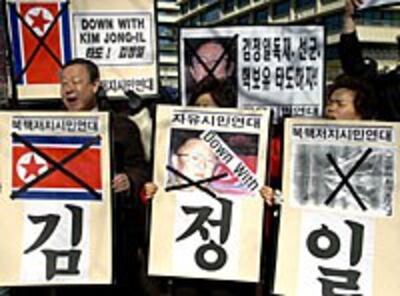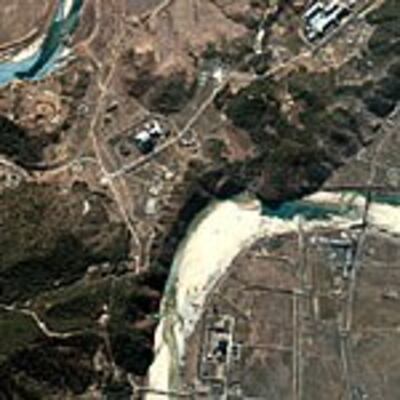
WASHINGTON—;North Korea has demanded bilateral talks with the United States over its nuclear weapons program, but Washington rejected the idea and insisted Pyongyang return to six-party negotiations.
Analysts say China may be able to play a role to defuse the situation and help bring North Korea back into multilateral negotiations, but they say China should only act in coordination with the other nations.
On Thursday North Korea made a surprise announcement and admitted for the first time that it had a nuclear weapons program, saying it needed to protect itself from hostile actions by the United States.
In a statement from the foreign ministry read on North Korean television, officials said they were indefinitely suspending multilateral talks about nuclear development. Other nations in the talks include China, Japan, South Korea and Russia.
On Friday, Pyongyang's ambassador to the United Nations said North Korea wanted to talk one-on-one with the United States. In an interview with South Korea's Hankyoreh newspaper, Han sung Ryol said, "If the United States wants to have direct dialogue with us, we can accept that as a change in its hostile policy toward North Korea."
Washington says 'no'
It's important that North Korea make the decision to permanently dismantle their nuclear weapons program.
The White House rejected the idea of bilateral talks and said the only possible option was a return to multilateral discussions. “This is a regional problem and it requires a multilateral approach for resolving it,” said White House spokesman Scott McClellan. "There are plenty of opportunities for North Korea to speak directly with us in the context of the six-party talks."
When asked why Washington did not want to hold direct talks with Pyongyang, McClellan said North Korea had violated a 1994 deal meant to end its nuclear weapons programs. "It's important that North Korea make the decision to permanently dismantle their nuclear weapons program. And that's the way that they'll get out of isolation," he said.
Former U.S. President Bill Clinton's administration forged a bilateral deal in 1994 that obligated North Korea to freeze its nuclear activities in return for oil and other aid. But Bush administration officials say the old deal was a failure that shouldn't be repeated because North Korea flouted it by running a secret uranium-enrichment program.
Door is still open
In an interview with RFA, Robert J. Einhorn, former Assistant Secretary of State for non-proliferation, now a scholar with the Center for Strategic and International Studies, said North Korea wants the world to accept its nuclear capability even as it hints negotiations may still be possible under certain conditions.
“Their desire," Einhorn said, "would be to have the world essentially accommodate to their nuclear capability without adopting strong measures to try to roll it back.”
Einhorn said the Bush administration tactic now will be to put pressure on China and South Korea to bring North Korea back to the negotiating table.
A political and economic ploy

Jing Huang, senior fellow on Chinese and Asia-Pacific security issues at The Brookings Institution told RFA that it is important to note that in its statement on Friday, Pyongyang says its nuclear program is for defensive purposes only in case of attack by the United States and that it has “suspended” not withdrawn participation in multilateral talks.
Huang said that North Korea has been “frustrated” with the lack of progress within the six-party talks and this could be an attempt on their part to move the negotiations to more substantial commitments. He says North Korea wants a no-strike guarantee from the United States and diplomatic recognition, as well as an economic package from the members of the six-party negotiations.
“The problem is that North Korea only has one card to play so instead of giving up their nuclear weapons program, they’re going to use it again asking for something more.”
China as intermediary
A senior level delegation from China is expected to travel to North Korea soon, according to Jack Pritchard of the Washington, D.C.-based think tank, the Brookings Institute. “In the past they have sometimes postponed those delegations,” said Pritchard, “but if they accept it then we will have a better sense of what might be happening based upon the kind of understanding the Chinese can get out of that meeting.”
While China is in a position to put pressure on North Korea or provide it with economic incentives to return to the talks, Huang said, as a key member of the multilateral group, China should only act in consultation with its partners in this process.
However, Huang said China should wait a few days before it reacts to North Korea's Thursday announcement. “In the short term I think the best way China can do on this is nothing. Wait a few days to see what North Korea can do.”
